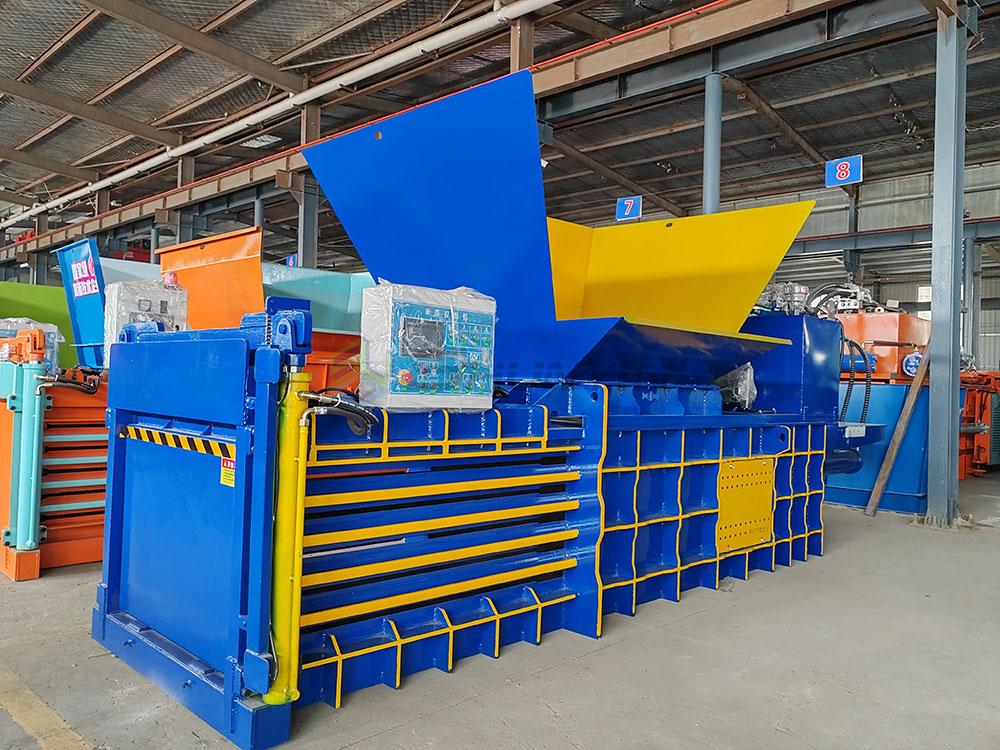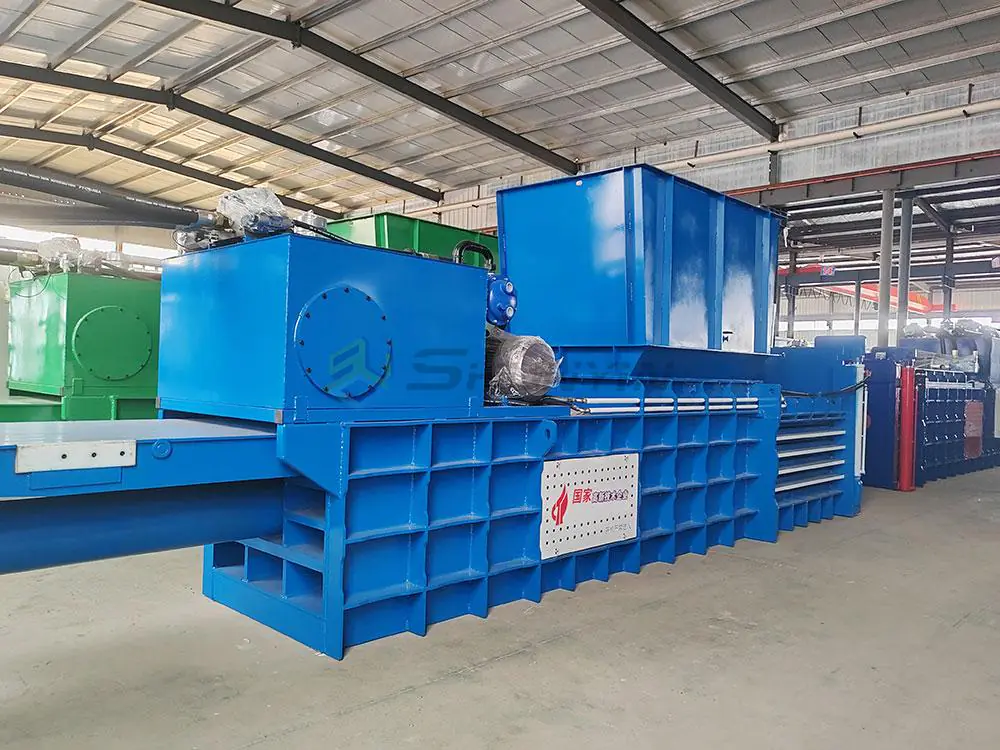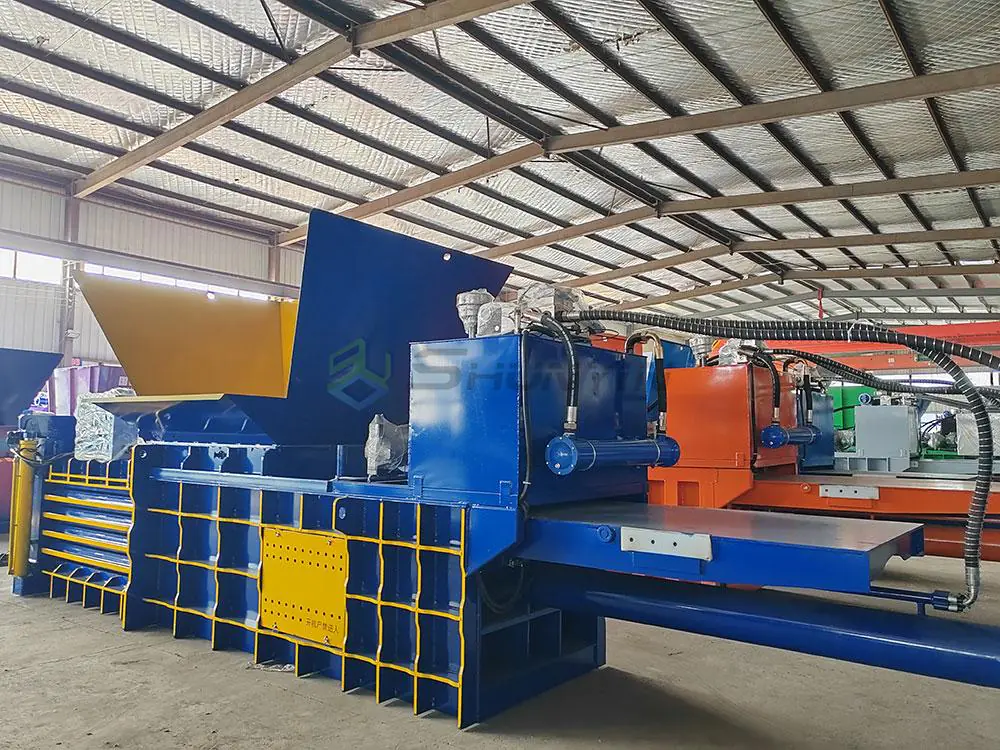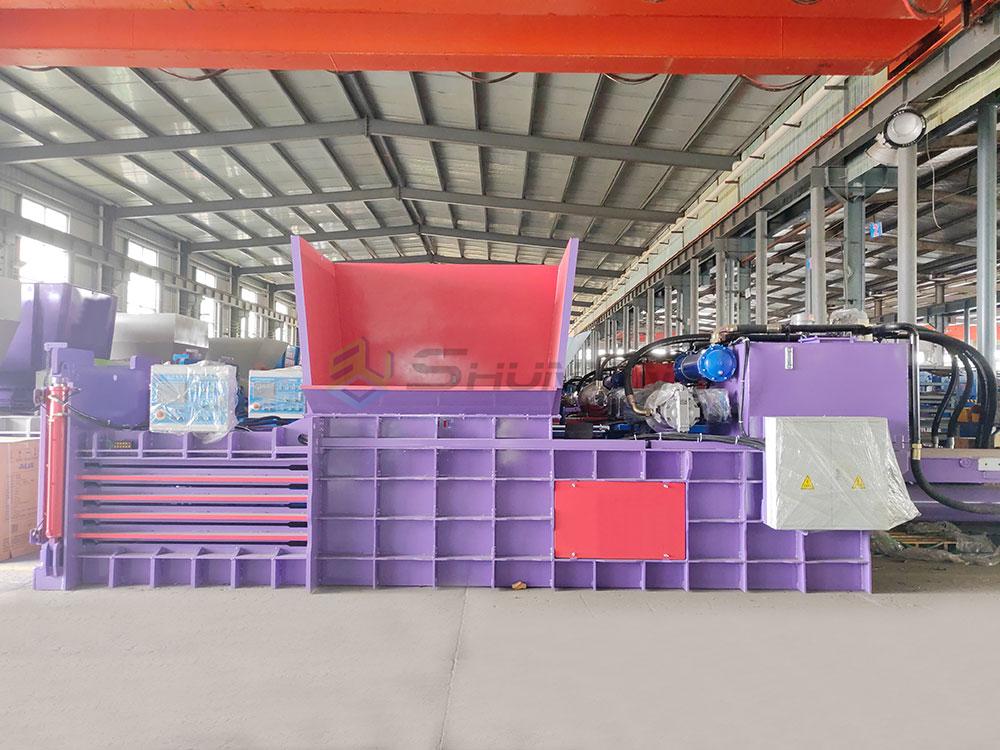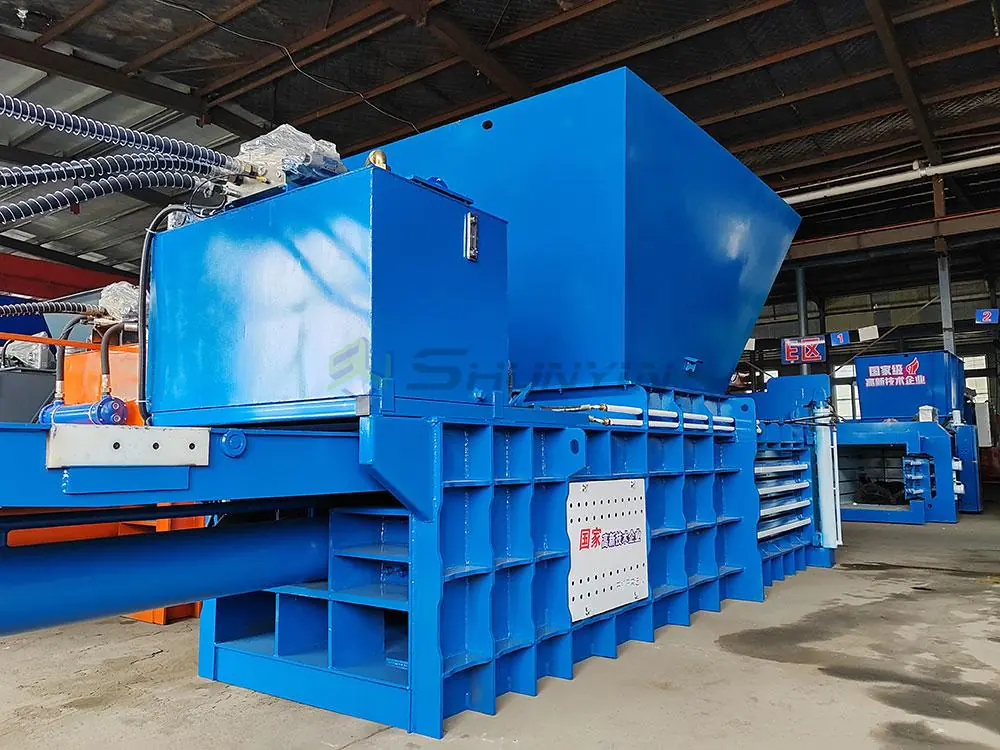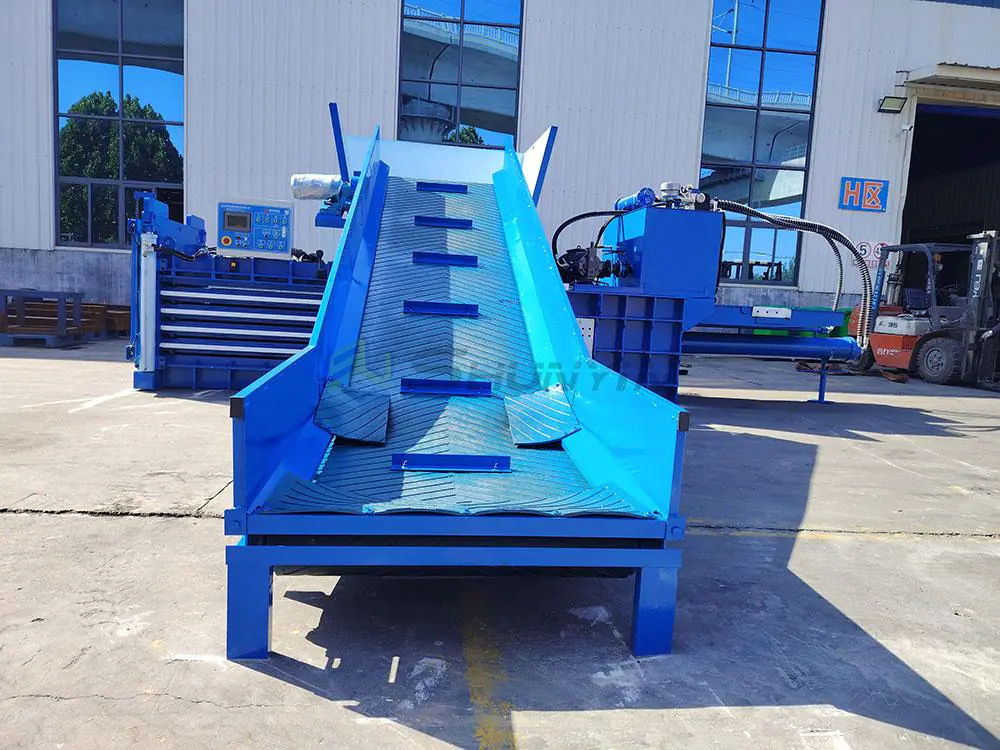
Heavy-duty horizontal hydraulic balers play a crucial role in industries that require efficient waste management. With their powerful hydraulic system, these machines offer both speed and reliability in compacting materials like cardboard, plastic, and metal. In this article, we’ll explore the key benefits of using a horizontal hydraulic baler and how it can improve your operational efficiency.
Benefits of a Heavy-Duty Horizontal Hydraulic Baler:
- Increased Efficiency: Handles high volumes, improving throughput.
- Higher Compression Power: Compresses materials tightly for easier storage and transport.
- Durability: Built to last, reducing maintenance costs.
- Improved Safety: Reduces risks in waste handling.
- Cost Savings: Lowers transportation and disposal costs.
- Customization: Adjustable settings for different materials and bale sizes.
- Environmental Benefits: Supports better recycling rates and sustainability.
A hydraulic baler can significantly reduce the need for large storage areas, making it easier for businesses to manage waste while promoting a more eco-friendly approach. But beyond that, the strength and design of a heavy-duty baler provide long-term reliability and high productivity, which every business looks for.
How strong is a baler?
A baler’s strength is a primary factor in determining how efficiently it can handle various types of materials. When it comes to heavy-duty horizontal hydraulic balers1, their strength is mainly determined by the hydraulic system and the build quality of the machine. These balers are designed to compress large quantities of waste into tightly packed bales, enabling efficient storage and transportation.
Hydraulic balers are extremely strong, capable of exerting thousands of tons of pressure to compress various materials. This strength allows them to process bulky materials such as paper, plastics, and metals with ease.

Power and Pressure of Hydraulic Systems
The strength of a hydraulic baler comes from the hydraulic pressure system2, which generates the power needed to crush and compress materials. The hydraulic system works by using a pump to generate pressure, which is then applied to the baler’s ram, compacting materials with immense force.
| Hydraulic System Power | Pressing Force | Material Types Processed |
|---|---|---|
| 250-500 tons | 10,000 psi | Cardboard, plastic, metal |
| 500-1,000 tons | 12,000 psi | Paper, textiles, scrap metal |
| 1,000+ tons | 15,000 psi | Wood, mixed recyclables |
As we can see from the table, hydraulic balers come in various sizes, offering different levels of strength to meet the needs of specific industries. Whether you are dealing with large volumes of cardboard or scrap metal, a hydraulic baler’s strength ensures that the materials are compacted efficiently.
Durability and Longevity
A key advantage of heavy-duty hydraulic balers is their long-lasting nature. These machines are built to withstand continuous use without significant wear and tear. Many balers are constructed with robust materials such as high-tensile steel, which ensures that the baler can handle extreme pressure and operate in tough environments.
What are the benefits of balers?
The benefits of using hydraulic balers in industrial and commercial applications extend beyond their strength. A baler provides numerous advantages that improve the efficiency and effectiveness of waste management. These include space savings, improved organization, cost reduction, and an increase in recycling capabilities.
Hydraulic balers improve operational efficiency, increase recycling rates, and save space by compacting waste into manageable bales, which are easier to store, transport, and handle.

Space Efficiency and Storage
One of the most significant benefits of a horizontal hydraulic baler is its ability to save space. By compressing large volumes of waste into compact bales, a baler reduces the need for expansive storage areas. This is especially useful in businesses where space is limited.
| Material Type | Uncompressed Volume | Compressed Bale Volume | Space Saved |
|---|---|---|---|
| Cardboard | 10 cubic meters | 2 cubic meters | 80% |
| Plastic | 15 cubic meters | 4 cubic meters | 73% |
| Paper | 12 cubic meters | 3 cubic meters | 75% |
As seen in the table, balers can drastically reduce the volume of waste, freeing up valuable space for other operations. This space-saving aspect is particularly important for businesses with high waste production, such as retail stores, warehouses, and manufacturing plants.
Improved Waste Recycling and Logistics
Hydraulic balers make it easier to segregate and recycle waste. By compressing recyclables into dense bales, these machines enhance the sorting process, ensuring that materials like cardboard, plastics, and metals can be efficiently separated for recycling.
The compact bales are also easier to handle, making logistics more manageable. They are easier to store, transport, and handle, leading to significant reductions in labor costs. Furthermore, balers ensure that waste is sorted and compacted to meet specific recycling standards, promoting eco-friendly practices.
Cost Reduction
While the initial cost of a baler might seem high, it can result in significant savings in the long run. Hydraulic balers can reduce labor costs by automating the waste management process. Additionally, by minimizing storage and transportation costs, balers contribute to a more cost-effective recycling operation.
| Expense Category | Traditional Waste Management | With Baler |
|---|---|---|
| Labor Costs | High | Low |
| Storage Costs | High | Low |
| Transportation Costs | Moderate | Low |
As shown in the table, hydraulic balers allow businesses to reduce costs in multiple areas, ultimately resulting in higher profitability.
Is a baler heavy machinery?
Yes, a hydraulic baler is considered heavy machinery due to its robust construction and large size. These machines are designed to handle significant pressure and process large amounts of waste, which means they are built with industrial-grade materials and components.
Heavy-duty hydraulic balers are considered heavy machinery because they are large, powerful, and specifically designed to handle large-scale waste processing.

Size and Capacity
The size of a hydraulic baler is an indicator of its classification as heavy machinery. These machines often weigh several tons and require significant space to operate. The size is necessary to accommodate the hydraulic systems and powerful motors needed for efficient waste compaction.
Safety and Operation
As with other heavy machinery, safety is a primary concern when operating a baler. Operators need proper training to safely use the machine and avoid accidents. Since balers are designed to exert immense force, it is essential to ensure that safety features, such as automatic shut-off systems and protective barriers, are in place to protect workers.
Maintenance and Care
Maintaining a hydraulic baler is crucial for its continued operation. Regular checks of the hydraulic system, motor, and safety features ensure that the baler runs smoothly and lasts for many years. Maintenance may involve lubricating moving parts, replacing worn-out components, and checking for any leaks in the hydraulic system.
Conclusion
A heavy-duty horizontal hydraulic baler offers numerous benefits, from its powerful strength to its efficiency in space-saving and recycling. These machines are essential for industries looking to streamline waste management processes while maintaining cost-efficiency and eco-friendly practices. Investing in a baler can lead to long-term savings and operational improvements, making it a smart choice for businesses with high-volume waste.


